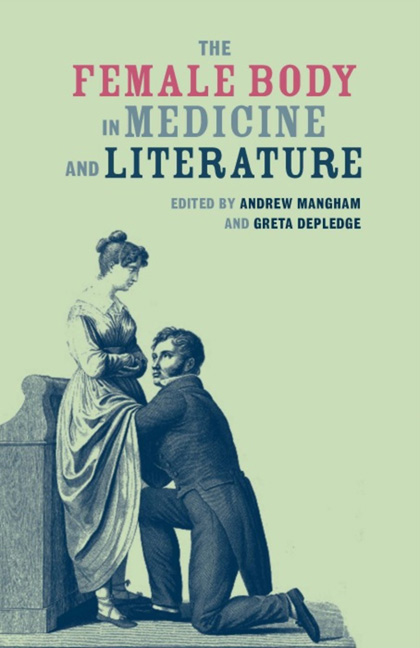Book contents
- Frontmatter
- Contents
- Acknowledgements
- Notes on Contributors
- 1 Introduction
- 2 ‘Difficulties, at present in no Degree clear'd up’: The Controversial Mother, 1600–1800
- 3 Monstrous Issues: The Uterus as Riddle in Early Modern Medical Texts
- 4 Surveilling the Secrets of the Female Body: The Contest for Reproductive Authority in the Popular Press of the Seventeenth Century
- 5 ‘Made in Imitation of Real Women and Children’: Obstetrical Machines in Eighteenth-Century Britain
- 6 Transcending the Sexed Body: Reason, Sympathy, and ‘Thinking Machines’ in the Debates over Male Midwifery
- 7 Emma Martin and the Manhandled Womb in Early Victorian England
- 8 Narrating the Victorian Vagina: Charlotte Brontë and the Masturbating Woman
- 9 ‘Those Parts Peculiar to Her Organization’: Some Observations on the History of Pelvimetry, a Nearly Forgotten Obstetric Sub-speciality
- 10 ‘She read on more eagerly, almost breathlessly’: Mary Elizabeth Braddon's Challenge to Medical Depictions of Female Masturbation in The Doctor's Wife
- 11 Mrs Robinson's ‘Day-book of Iniquity’: Reading Bodies of/and Evidence in the Context of the 1858 Medical Reform Act
- 12 Rebecca's Womb: Irony and Gynaecology in Rebecca
- 13 Representations of Illegal Abortionists in England, 1900–1967
- 14 Afterword: Reading History and/as Vision
- Index
11 - Mrs Robinson's ‘Day-book of Iniquity’: Reading Bodies of/and Evidence in the Context of the 1858 Medical Reform Act
- Frontmatter
- Contents
- Acknowledgements
- Notes on Contributors
- 1 Introduction
- 2 ‘Difficulties, at present in no Degree clear'd up’: The Controversial Mother, 1600–1800
- 3 Monstrous Issues: The Uterus as Riddle in Early Modern Medical Texts
- 4 Surveilling the Secrets of the Female Body: The Contest for Reproductive Authority in the Popular Press of the Seventeenth Century
- 5 ‘Made in Imitation of Real Women and Children’: Obstetrical Machines in Eighteenth-Century Britain
- 6 Transcending the Sexed Body: Reason, Sympathy, and ‘Thinking Machines’ in the Debates over Male Midwifery
- 7 Emma Martin and the Manhandled Womb in Early Victorian England
- 8 Narrating the Victorian Vagina: Charlotte Brontë and the Masturbating Woman
- 9 ‘Those Parts Peculiar to Her Organization’: Some Observations on the History of Pelvimetry, a Nearly Forgotten Obstetric Sub-speciality
- 10 ‘She read on more eagerly, almost breathlessly’: Mary Elizabeth Braddon's Challenge to Medical Depictions of Female Masturbation in The Doctor's Wife
- 11 Mrs Robinson's ‘Day-book of Iniquity’: Reading Bodies of/and Evidence in the Context of the 1858 Medical Reform Act
- 12 Rebecca's Womb: Irony and Gynaecology in Rebecca
- 13 Representations of Illegal Abortionists in England, 1900–1967
- 14 Afterword: Reading History and/as Vision
- Index
Summary
Through the summer months of 1858, the newspaper-reading public was both shocked and tantalized by the ubiquitous and detailed reporting of the Robinson v. Robinson and Lane divorce case. Despite the fact that this case was deemed, by the Lord Chief Justice no less, to be nothing short of ‘remarkable in its character and circumstances’, few modern readers appear aware of its existence, let alone its import. Thus this chapter is, in part, an act of essential recuperation. For as was recognized, even at the time, the Robinson divorce case involved ‘large social interests […] which have a much wider range than the petty and personal issues among the individuals immediately implicated or concerned’. Coming before the public at a pivotal moment in the professionalization of medicine – the passing of the 1858 Medical Reform Act – the case directed the nation's attention towards a singularly important encounter between physician and patient. As we shall see, the ‘large social interests’ arising from this seemingly ‘petty and personal’ encounter involved nothing less than the collective authority and status of the medical profession.
Opening their copy of The Times on 15 June 1858, readers encountered the following narrative about the marriage and divorce of Mr and Mrs Robinson. The petitioner, Mr Henry Robinson, a civil engineer, married the respondent, Isabella Elizabeth Robinson, then a widow with an independent income, in 1844. For more than a dozen years they seemed, to all outward appearances, to be a respectable, if not altogether happy, married couple. In 1857, however, Mrs Robinson became ill and, as was reported in The Daily News, ‘in consequence of some hints which she let fall while she was in a delirious state her husband took possession of her diary’. Like the latest novel from Mudie's, the diary extended to the requisite three volumes and covered a period of five years between 1850 and 1855. Among the entries for 1854 were certain passages that appeared to suggest that the author had engaged in an adulterous affair with a trusted family friend, Dr Edward Lane. Lane was the proprietor of a well-known hydropathic establishment and a respected young physician who had married into the peerage and counted Charles Darwin among his patients.
- Type
- Chapter
- Information
- The Female Body in Medicine and Literature , pp. 169 - 181Publisher: Liverpool University PressPrint publication year: 2012



